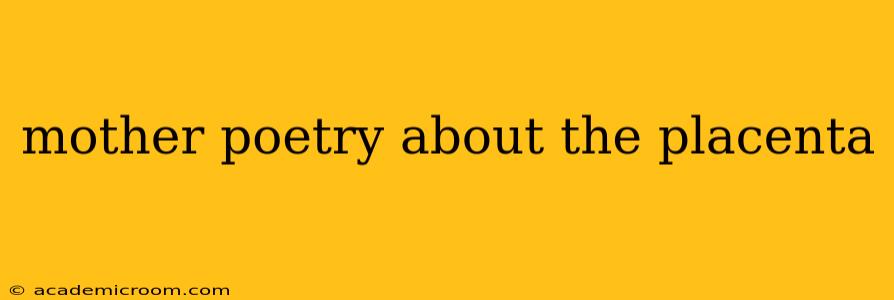The placenta, a silent, unseen friend, A bridge of life, a journey without end. A crimson tapestry, woven with such grace, Nourishing life in this sacred space.
For nine months long, it diligently toiled, Filtering toxins, a mother's love unsoiled. A life support system, intricate and vast, Providing sustenance, holding moments fast.
It's a mystery, this organ so profound, A temporary home, where life is found. A symbol of connection, a bond so strong, A silent guardian, where we both belong.
What is the placenta's role during pregnancy?
The placenta's role during pregnancy is paramount. It acts as a vital intermediary between the mother and the developing fetus, performing numerous crucial functions:
- Nutrient Delivery: The placenta extracts essential nutrients like oxygen, glucose, and vitamins from the mother's blood and transports them to the fetus.
- Waste Removal: Conversely, it efficiently removes waste products, such as carbon dioxide and urea, from the fetal bloodstream, preventing their buildup and potential harm.
- Hormone Production: The placenta synthesizes and releases several essential hormones, including human chorionic gonadotropin (hCG), progesterone, and estrogen, vital for maintaining pregnancy. These hormones regulate various bodily functions in both mother and fetus.
- Immune Protection: While offering protection, the placenta also carefully manages the exchange of immune cells, balancing the need to protect the fetus from maternal immune responses while allowing for essential immune development.
- Barrier Function: While it facilitates exchange, the placenta also acts as a selective barrier, preventing the passage of certain harmful substances from the mother to the fetus. However, it's crucial to remember that this barrier is not absolute, and some substances can still cross.
What happens to the placenta after birth?
After the baby is born, the placenta, often referred to as the "afterbirth," is delivered. This process is usually fairly quick and straightforward. The placenta is then typically examined by medical professionals to ensure it's complete and there are no complications.
Is the placenta considered a sacred object in some cultures?
Yes, absolutely! In many cultures, the placenta is viewed as a sacred object, representing the profound connection between mother and child. Various traditions involve the careful disposal or ceremonial burial of the placenta. These practices often symbolize respect for the life-giving role the placenta played during pregnancy, and sometimes hold spiritual significance, marking the beginning of the child's journey.
What are the different ways to dispose of the placenta after birth?
Several options exist for placenta disposal:
- Hospital Disposal: Hospitals typically have standard procedures for placenta disposal, usually incineration or landfill.
- Burial or Encapsulation: Some mothers opt for burial or encapsulation, where the placenta is carefully prepared and either buried in a designated location or preserved in a capsule.
- Placenta Consumption (Placentophagy): While less common, some individuals consume the placenta, often believing it offers health benefits. The safety and efficacy of placentophagy are still under debate and should be discussed with healthcare professionals.
What are some of the beliefs surrounding the placenta?
Beliefs surrounding the placenta vary greatly across cultures and time periods. Some common themes include:
- Life-Giving Power: The placenta's role in sustaining fetal life naturally leads to views associating it with fertility, growth, and vitality.
- Spiritual Significance: In many spiritual practices, the placenta holds symbolic meaning relating to the connection between the mother, child, and the spiritual realm.
- Protection and Good Luck: Some believe the placenta holds protective energies for the child, and its respectful treatment brings good luck.
This poem and the following information aim to offer a deeper understanding of the placenta, moving beyond a simple biological explanation to encompass the profound emotional, cultural, and spiritual significance it holds for countless mothers around the world. Remember to always consult with your healthcare provider for personalized guidance and accurate information about your pregnancy and postpartum care.
